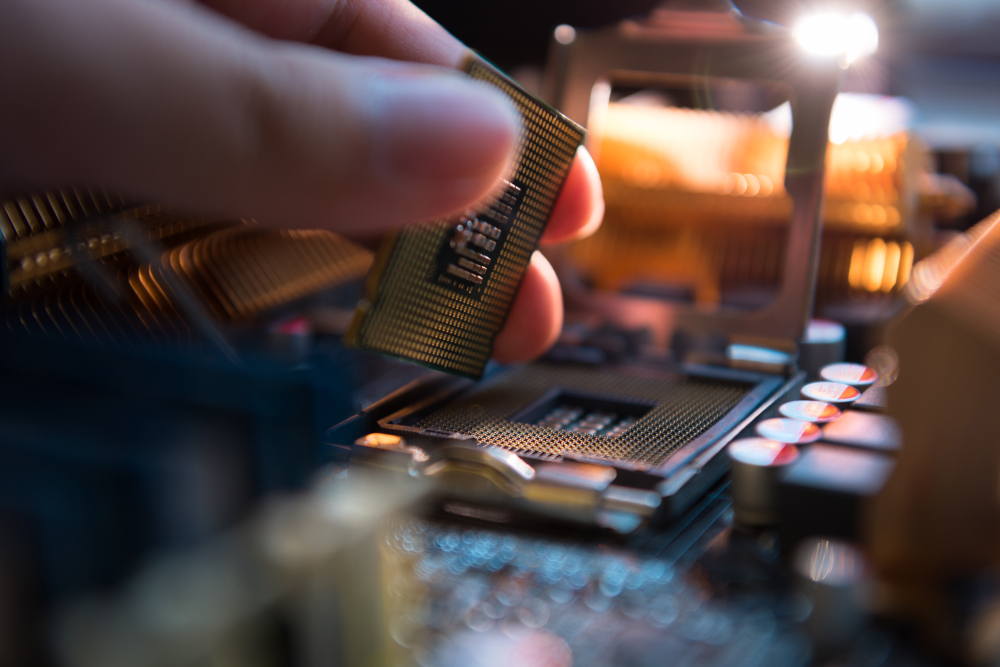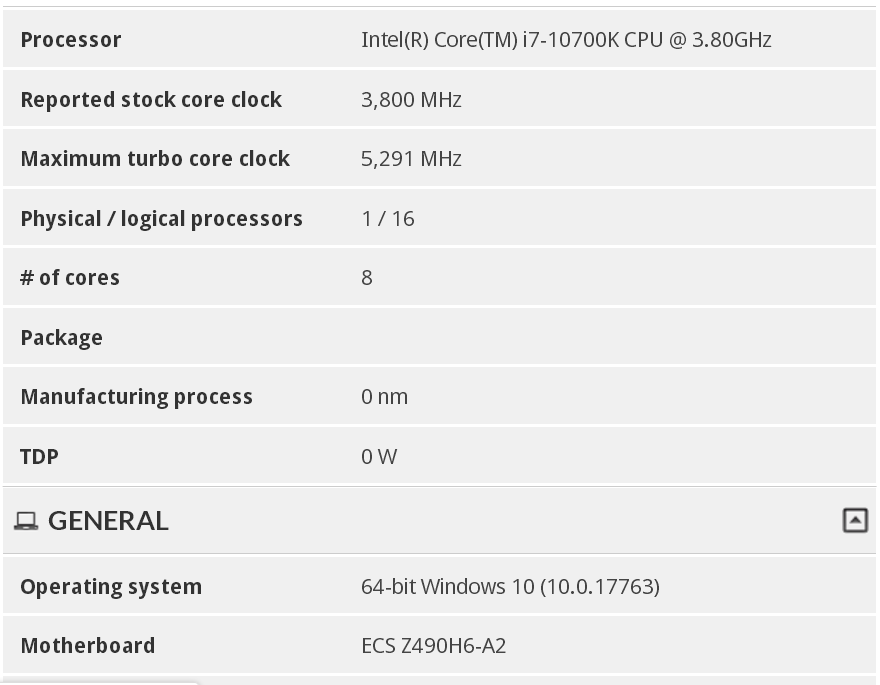Intel Core i7-10700K Comet Lake CPU Spotted Boosting to 5.3 GHz
Early benchmark results point to 8 cores, 16 threads and a 3.8-GHz clock speed.

Intel hasn't confirmed when it will launch its 10th Generation Comet Lake desktop CPUs (although rumors suggest we'll see them in April). But benchmarks and specification tables are already coming at us left and right. On the higher-end of the desktop platform, we've already heard about the Core i5-10500, Core i9-10900 and Core i9-10900K. Today's early benchmark, found by Twitter user @Tum_Apisak, is about the i7-10700K, a chip that may appeal to many enthusiasts. As with any test results shared before an official release, however, you should take things with a grain of salt or two.
The leak comes in the form of a 3DMark hardware configuration that shows some of the specifications of the i7-10700K. There are a few errors, but that's not unusual for pre-launch chips that haven't been properly taken up in the libraries yet.
The specifications show the i7-10700K with eight cores, 16 threads with a base clock speed of 3.8 GHz and a boost maximum turbo clock of 5.3 GHz.
It's not surprising to see the chip with eight cores and Hyper-Threading. What does come as a surprise is the boost clock reaching 5.3 GHz, which surpasses the 5.1-GHz boost clock spotted for the i9-10900K. Note the latter has two more cores.
Intel has received a lot of flack for staying on the 14nm process for its upcoming Comet Lake CPUs, and there have been reports that problems with power consumption on the new series have delayed the CPUs' launch.
We also saw that the current-gen i9-9900K was happy to churn through 200W without too much effort. If Intel were to make the jump to a smaller manufacturing node, it could reduce the power consumption and create a viable upgrade, but unfortunately, Intel has been having problems making the jump to 10nm since 2018.
Over are the days when we saw Intel working with a tick-tock strategy, where each year it outed a chip with a new architecture and then shrunk that architecture's process node a year later.
Get Tom's Hardware's best news and in-depth reviews, straight to your inbox.
But that doesn't mean that we're not expecting to get an upgrade with Comet Lake on desktop. The most similarly stacked chip to the i7-10700K from the 9th Generation is the eight-core, 16-thread i9-9900K, which has a maximum boost clock of 5.0 GHz. That's an i9 chip though, and where the i9 is getting two more cores, it looks like the i7 will be getting back Hyper-Threading and more aggressive boost profiles.
It looks like Intel is doing its best to squeeze every last bit of power out of its upcoming chips. We'll have to wait and see if Comet Lake is able to bring some more competitiveness to the market.
Niels Broekhuijsen is a Contributing Writer for Tom's Hardware US. He reviews cases, water cooling and pc builds.
-
jgraham11 Seems to be typo as I am pretty sure Intel has been having problems with their 10nm node for a lot longer than since 2018...Reply
I wonder if Comet lake will fix the known CPU bugs: Meltdown, Specter, Zombieload, Fallout, Cacheout.
Will Intel recommend users disable Hyper-threading like they have on their previous and current processors because of these bugs... -
RodroX So another early benchmark results thingy with, no benchmark results.Reply
So if the specs are somehow accurated it will be something like a i9 9900K/KS, just probably not the same performance cause, if it was the same performance I can forsee a lot of high end intel adopters and fanboys who got this expensive cpus really pissed.
Only thing to do is wait, and see what happend when the independent reviews shows up. -
joeblowsmynose ReplyN_tell said:If it were really 0nm.
0nm has been delayed due to lack of substance. -
TCA_ChinChin Reply
Comet Lake is another refresh of 14nm, not 10nm.jgraham11 said:Seems to be typo as I am pretty sure Intel has been having problems with their 10nm node for a lot longer than since 2018... -
joeblowsmynose So is the 5.29 what the CPU reported its boost clock is, or what the software read the boost clock as? Because if it is not the latter, then the article title is very misleading and click-baity. ... "spotted boosting to ..."...Reply
I am also thinking that Intel may be trying to do with boost what AMD did for Zen2 - very short time-frame boosting that might aid in some "bursty" operations, as AMD put it.
Unfortunately, if this turns out to be the case, it won't offer near the performance boost (pun intended) of a full time single or dual core boost that we see in the 9th gen. Just as with Ryzen, when AMD "fixed" the boost clock issue, there' really wasn't a whole lot of performance gains.
We'll have to wait and see though ...
BTW a 10 core 14nm CPU sounds like a terrible idea to me (10900k). It still won't compete with high end ryzen and won't clock as well as the 10700k, and will be hotter than the surface of the sun. Intel should scrap that stupid idea and put the resources into making the best 6 and 8 cores they can with 14nm and defend their tiny gaming crown ... actually the way these rumours are shaping up, this might actually be what is happening ... the 10700k will be way more desirable over a 10900k ... if you need more than 8 cores, the intelligent choice right now is Ryzen. The 10900k should be relegated as the "fanboi special" ;) -
mdd1963 I will withhold judgement on this CPU until seeing it's actual Battlefield 5 framerates compared to those of existing 9700K/9900K...Reply
A single core boosting to 5.3 GHz for a max of 30 seconds then downclocking itself by 500-600 MHz due to TDP restrictions will not win over many gaming fans... -
jimmysmitty Replyjoeblowsmynose said:So is the 5.29 what the CPU reported its boost clock is, or what the software read the boost clock as? Because if it is not the latter, then the article title is very misleading and click-baity. ... "seen boosting to ..."...
I am also thinking that Intel may be trying to do with boost what AMD did for Zen2 - very short time-frame boosting that might aid in some "bursty" operations, as AMD put it.
Unfortunately, if this turns out to be the case, it won't offer near the performance boost (pun intended) of a full time single or dual core boost that we see in the 9th gen. Just as with Ryzen, when AMD "fixed" the boost clock issue, there' really wasn't a whole lot of performance gains.
We'll have to wait and see though ...
BTW a 10 core 14nm CPU sounds like a terrible idea to me (10900k). It still won't compete with high end ryzen and won't clock as well as the 10700k, and will be hotter than the surface of the sun. Intel should scrap that stupid idea and put the resources into making the best 6 and 8 cores they can with 14nm and defend their tiny gaming crown ... actually the way these rumours are shaping up, this might actually be what is happening ... the 10700k will be way more desireable over a 10900k ... if you need more than 8 cores, the intelligent choice right now is Ryzen. The 10900k should be relegated as the "fanboi special" ;)
So the 7900X and TR 1920X were terrible ideas? Because the 7900X was a 10 core 14nm, first gen Skylak-X, and the TR 1920X was a 12 core 14nm CPU.
The only difference here is the boost clock rates and sustained clock rates for all cores. The 7900X was a much earlier 14nm so it was not as able to sustain the clock speeds that the 10900K will.
mdd1963 said:I will withhold judgement on this CPU until seeing it's actual Battlefield 5 framerates compared to those of existing 9700K/9900K...
A single core boosting to 5.3 GHz for a max of 30 seconds then downclocking itself by 500-600 MHz due to TDP restrictions will not win over many gaming fans...
I would think the clock speed they can maintain overclocked on all cores would matter more for gamers. I doubt most 9700K/9900K/KS are stock speeds nor would the 10700K or 10900K be. -
mdd1963 No one is denying that many overclock their CPUs, myself included....Reply
But, true 'stock' behavior might only have a max turbo clock hit for 30 seconds or so...(yes, it's easily overcome, but, many comparisons will be done in stock configuration, vice MCE-enabled, TDP limits removed, etc...) It's also possible that with upcoming CPU-integrated Meltdown/Spectre mitigation microcodes, the 5.3 GHz CPUs might only match or barely exceed the results of those of the previous gen, but, I hope that is not the case)
With 5.3 GHz turbos, I'm sure many are already dreaming of all core overclocks of 5.4 GHz, but, I'd wager 5-1 that this does not occur very often, and, undoubtedly would be at 160-180 watts TDP if it did...
I'm suspecting an 8c/16t at higher clocks would likely fare better at most gaming scenarios than a 10c/20t part at 200-300 MHz less speeds...
It will be an interesting year for the enthusiast, as Ryzen 4000 desktop arrives to compare to existing Intel 9th gen and upcoming 10700K/10900K... -
jimmysmitty Replymdd1963 said:No one is denying that many overclock their CPUs, myself included....
But, true 'stock' behavior might only have a max turbo clock hit for 30 seconds or so...(yes, it's easily overcome, but, many comparisons will be done in stock configuration, vice MCE-enabled, TDP limits removed, etc...) It's also possible that with upcoming CPU-integrated Meltdown/Spectre mitigation microcodes, the 5.3 GHz CPUs might only match or barely exceed the results of those of the previous gen, but, I hope that is not the case)
With 5.3 GHz turbos, I'm sure many are already dreaming of all core overclocks of 5.4 GHz, but, I'd wager 5-1 that this does not occur very often, and, undoubtedly would be at 160-180 watts TDP if it did...
I'm suspecting an 8c/16t at higher clocks would likely fare better at most gaming scenarios than a 10c/20t part at 200-300 MHz less speeds...
It will be an interesting year for the enthusiast, as Ryzen 4000 desktop arrives to compare to existing Intel 9th gen and upcoming 10700K/10900K...
Of course. A 10700K will probably be able to maintain higher clocks longer. The 9700K is seen as the better gaming CPU and in most cases OCed higher than the 9900K did.
I don't think this year will be very interesting. When Intel finally gets 10nm out of the way and moves to 7nm that will be interesting. Ice Lake and Tiger Lake have both shown promising performance improvements over previous generations. Ice Lake seems to perform better at lower clock speeds than its previous gen counterparts and Tiger Lake looks to increase that performance. Once we can have those at decent clocks and core counts on consumer desktop it will be an interesting battle.

